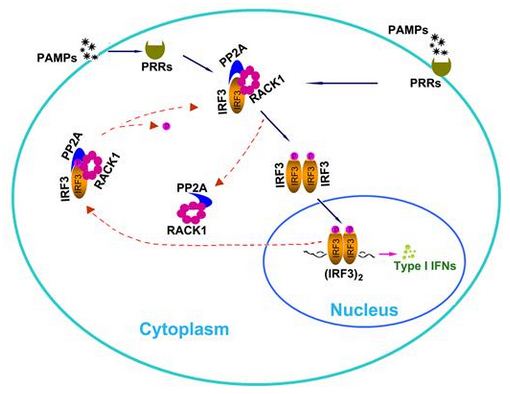The international academic journal "Immunity" (IMMUNITY) published the latest online research titled Recruitment of Phosphatase PP2A by RACK1 Adaptor Protein Deactivates Transcription Factor IRF3 and Limits Type I Interferon Signaling by the Xie Dong research group of the Shanghai Academy of Life Sciences, Chinese Academy of Sciences. Research results. This work reveals a ubiquitous new mechanism for negatively regulating the type I interferon signaling pathway.
Type I interferon (type I interferon) pathway is the main component of innate immunity, and plays an important role in the process of body control and elimination of pathogens, and IRF3 is a key transcription factor of type I interferon pathway. The molecular mechanism of IRF3 activation has been studied relatively clearly, but its corresponding inactivation mechanism is still poorly understood. The currently recognized main mechanism of negative regulation of IRF3 is the degradation of IRF3 protein caused by viral infection.
Under the guidance of Researcher Xie Dong, Long Lingyun, PhD student of the Institute of Nutrition, Shanghai Academy of Biosciences, and Associate Researcher Deng Yuezhen found that the host cells will initiate a new mechanism when stimulated by LPS, polyI: C and low-dose viral infection— -IRF3 is deactivated by dephosphorylation (instead of degrading), and only high doses of viral infection will cause IRF3 degradation. Further research proves that during this process, the phospholipase PP2A is specifically dephosphorylated by the linker protein RACK1, and IRF3 and IRF7 are dephosphorylated; the PP2A knockout mice are more infected when they are infected by the VSV virus. The large amount of type I interferon greatly reduced the mortality rate when subjected to lethal dose of VSV. This study reveals for the first time a new mechanism for the widespread IRF3 inactivation, which provides new ideas for the study of the entire interferon regulatory factor superfamily (IRF); it also provides diseases related to type I interferon disorders (autoimmune diseases and The treatment of sepsis, etc.) provides a new strategy.
The research work was supported by funding from the Ministry of Science and Technology, the National Natural Science Foundation of China and the Chinese Academy of Sciences.

New mechanism of negative regulation of type I interferon signaling pathway
Adjustable Tables,Adjustable Lap Desks,Stable Lifting Desks,Computer Standing Desks
Shaoxing contuo Transmission Technology Co.,Ltd , https://www.ctelectricdesk.com